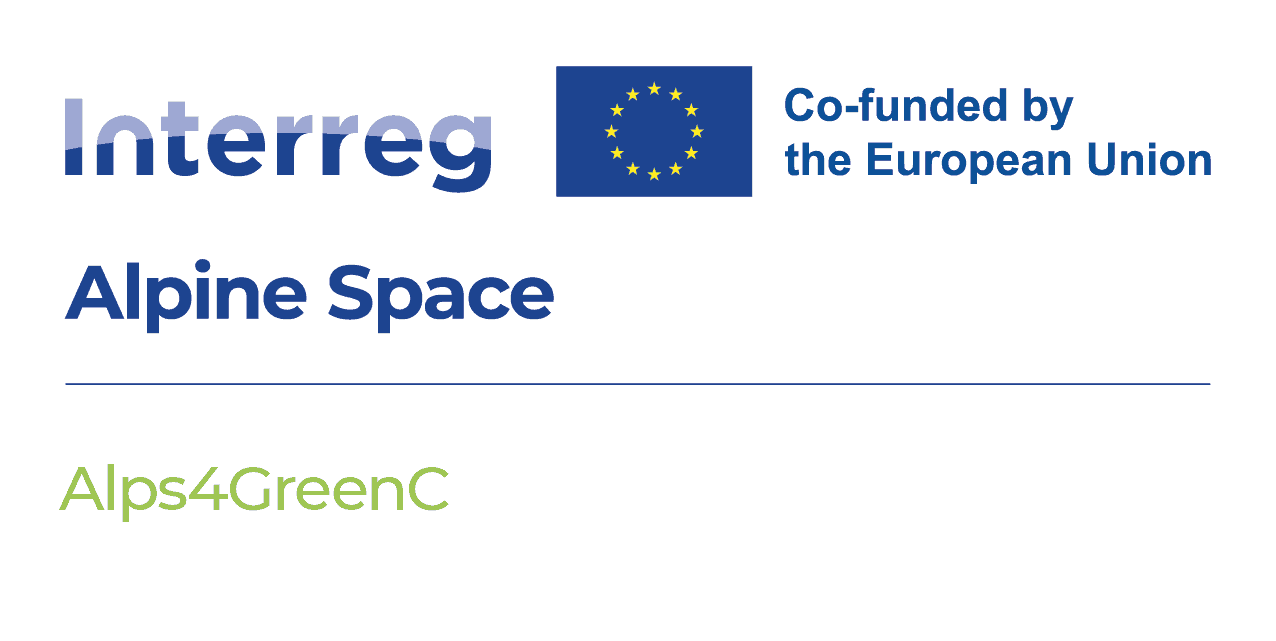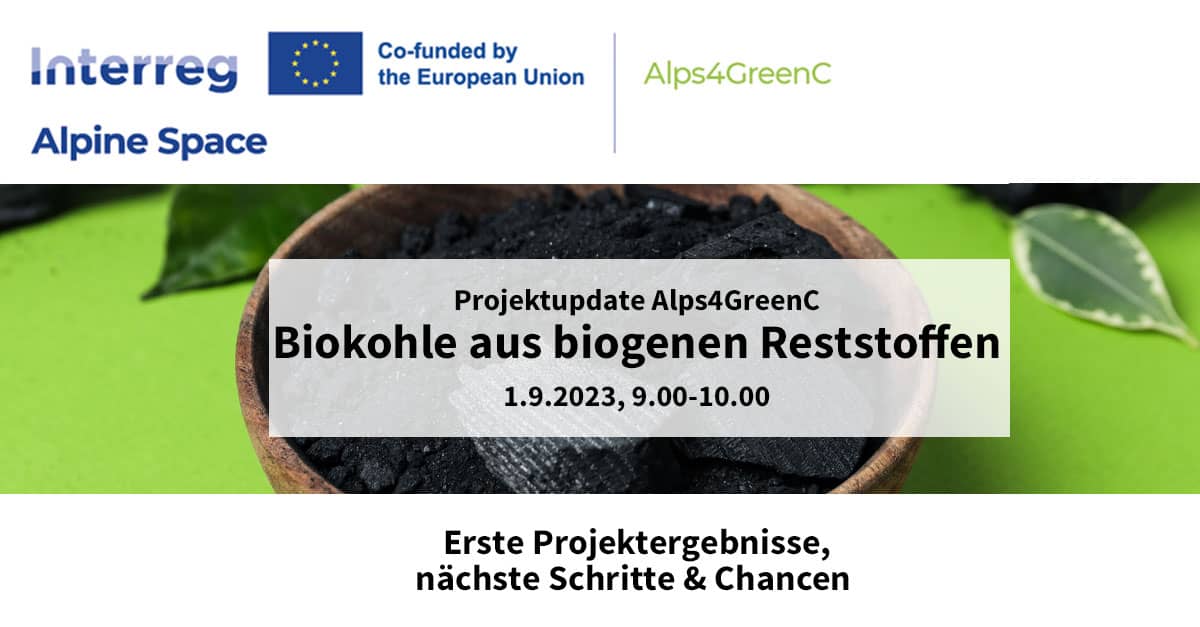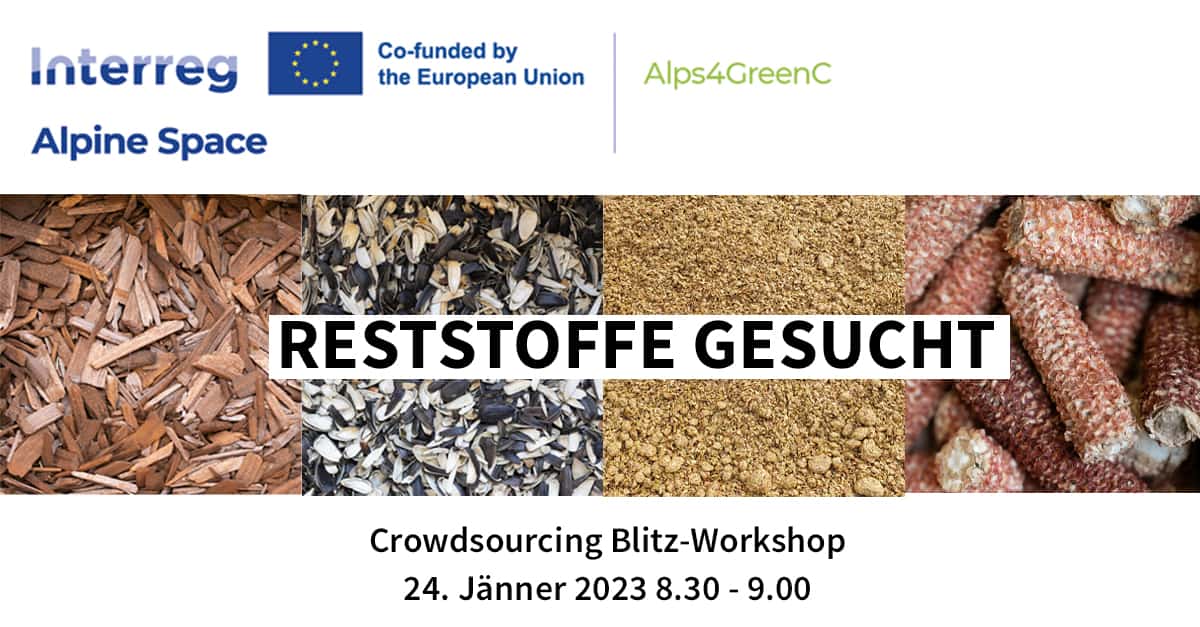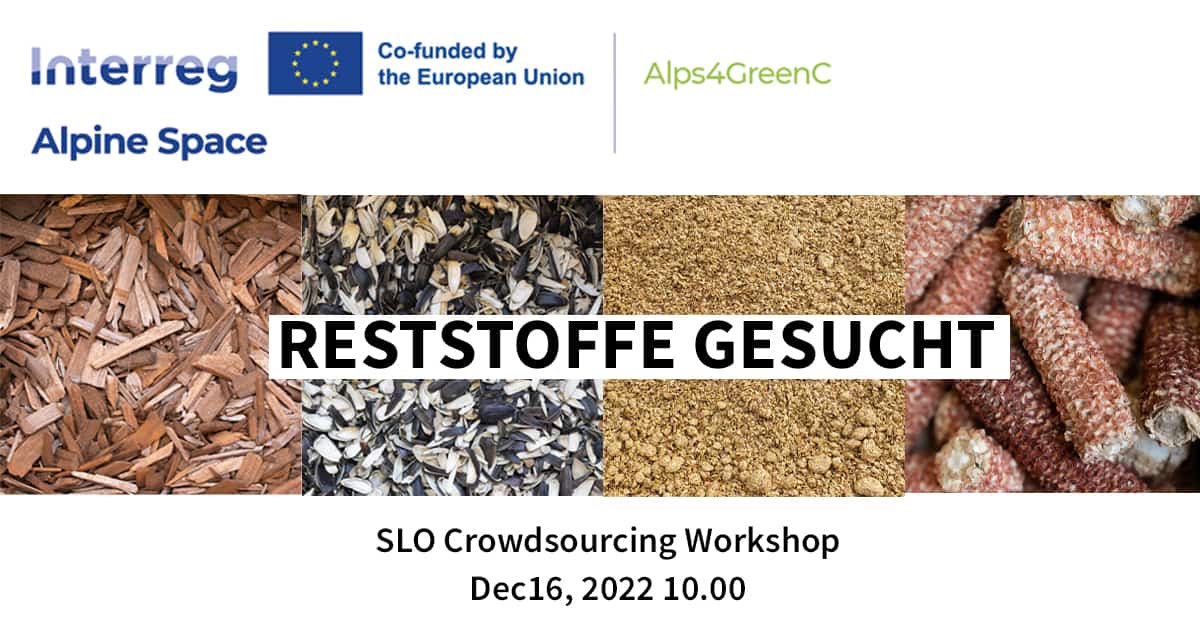
Overview
The energy dependency of the Alpine region further increases its vulnerability to climate change and the loss of biodiversity. Biochar and green carbon from biomass residues can make a significant contribution to reduce this dependency. The project Alps4GreenC contributes to the conditions for energy sufficiency and climate protection of the region by setting the scene for a transnational utilisation of biomass residues. Through policy recommendations and the pilot production of green carbon, the project investigates the opportunities for biomass conversion and proposes transnational biochar-based value chains. This first transnational collaboration for the establishment of biochar-production value chain will enable to identify and upgrade the appropriate technologies for biomass conversion and to fully realise the shift to green, post-carbon approaches .
Factsheet
- 2021 – 2027
- Carbon neutral and resource sensitive Alpine region
- SO 2.2 - Promoting the transition to a circular and resource efficient economy
-
- AG9 Energy efficiency and renewable energy
- 09/2022
- 02/2024
- 740.866 EUR
- 555.650 EUR
Description
The Alps4GreenC project is focused on setting-the-scene for transnational utilization of biomass residues through investigation of biomass conversion opportunities in project partner countries and proposal of transnational biochar-based value chains. As such, we are tackling the challenges of the Alpine area pertaining to adverse effects of energy dependency and high energy prices, biodiversity losses and high vulnerability to climate change, while offering solutions for the use of greatly available biomass in the region. By proposing the necessary supportive measures through policy recommendations and practical testing and pilot production of green carbon to evaluate the potential of its utilisation for steel and agriculture industry, we will contribute towards creating the conditions for energy sufficiency and climate-protection of the region showcasing the innovation and resource potentials already present, but currently disconnected. The advantages of this transnational collaboration will be primarily experienced by those directly involved in the value chain (residue producers, tech providers and end users, hence large enterprises and SMEs), however other stakeholders in the ecosystem, such as national/regional public authorities, sectoral agencies and higher education and research organisations, will also benefit from comprehensive framework creation. The framework we propose includes mapping of stakeholders & resources, implementation of crowdsourcing campaign to collect biomass residues and raise awareness, testing and piloting of biochar and context & gap analysis of biomass conversion opportunities for green carbon supply. Without a transnational approach to this issue, appropriate technologies for biomass conversion will not be identified and upgraded, therefore the shift to green, post-carbon approaches might not be fully realised. It is the first time, transnational collaboration for the establishment of biochar production value chain is foreseen.
Partners
- Lead partner
- Slovenia
- Zahodna Slovenija (SI04)
- Ljubljana
- Blaž Likozar
- blaz.likozar@ki.si
- Slovenia
- Vzhodna Slovenija (SI03)
- Maribor
- Nina Meglič
- nina.meglic@stajerskagz.si
- Austria
- Steiermark (AT22)
- Graz
- Manuel Schwabl
- manuel.schwabl@best-research.eu
- Italy
- Provincia Autonoma di Bolzano/Bozen (ITH1)
- Bolzano
- Marco Baratieri
- marco.baratieri@unibz.it
- Austria
- Niederösterreich (AT12)
- St. Pölten
- Thomas Timmel
- thomas.timmel@biobase.at
- Italy
- Veneto (ITH3)
- Legnaro
- Diego Rossi
- rossi.aiel@cia.it
- 46.04286695000000414.493045191407113
- 46.556820715.6511151
- 47.05826765000000515.46359123464252
- 46.4983248511.350104387045558
- 48.202933415.6312028
- 45.34425711.9574906
Outcomes
-
Biochar pilots
DownloadThe CSC (A1.1) collected the interests of 22 companies from SI, AT, and IT, A methodology for residue selection, analyses, lab tests, pilot tests, and biochar analyses was developed. Based on the criteria, 10 residues were selected and lab-tested via gasification or pyrolysis, and 2 were pilot-tested. Transnational cooperation facilitated the transfer of know-how on optimal operating conditions, resulting in a comprehensive analysis of 12 biochar samples, indicating potential use in agriculture and the steel industry. Certificates of analysis were prepared for residue providers, detailing biomass residue analysis, conversion technology, biochar analysis results, and application potential. The CSC demonstrated that numerous biomass residues are suitable for biochar valorization via pyrolysis or gasification. Project results showed that different residues and their biochars suit various applications. The performance of produced green carbon is presented in a library of 12 samples available on an open platform repository, extending the European mapping of lignocellulosic residues. This repository provides analytical results for all 10 residues and 12 biochars. Certificates for the ten CSC participants and D1.3.1 are available. In A1.2, an interactive Alps4GreenC map was developed, to categorize economic activities related to biomass residue supply chains across Europe. Using a comprehensive methodology, Eurostat data was utilized to identify and prioritize relevant companies and economic activities. Stakeholders within the supply chain were considered, aiding the categorization of economic activities at national and regional levels. -
Alps4GreenC Policy recommendations
DownloadBiochar and green carbon from biomass residues can reduce the energy dependency of the Alpine region, improve climate resilience and protect biodiversity. Understanding regulatory and policy framework is essential for participation in the green carbon supply chain. IT, SI and AT are leading the way in their efforts, characterised by their unique political, financial and environmental landscape. The Alps4GreenC policy recommendations are the result of collaboration between the partners and focus on the opportunities for biomass conversion for green carbon supply. Based on data from two structured questionnaires and supported by biochar experts from SI and DE, highlight legal, socio-cultural, political, economic and geographical factors that influence biomass conversion initiatives and serve as a catalyst for informed decision-making. The success of biomass conversion depends on strategic planning and support. Understanding geographical, climatic and logistical factors combined with proactive policies and financial incentives is critical to the growth and integration of biomass solutions in IT, SI and AT. By addressing knowledge gaps, creating incentives and advocating for supportive policies, these countries aim to promote biochar technologies that contribute to sustainable practises, environmental protection and benefits such as improved soil health and carbon sequestration. Best practises in biochar production across the Alpine region demonstrate innovative and sustainable solutions, such as Sonnenerde’s garden applications, Nawaro Energie’s biomass plant, Humus+’s soil improvement project, Vulkanland’s biomass heating and Energiwerk Ilg’s sustainable road surfacing. CORC’s co-operation model, AquaGreen’s conversion of wet sewage sludge and various projects in SWE and DE show the versatility of biochar. LOIs were signed to support the implementation of recommendations to promote the use of biochar and encourage sustainability in the Interreg Alpine Space region.
Pilots
-
Biochar pilots
DownloadThe Alps4GreenC project aimed at implementing transnational value-chains in the Alpine territories to facilitate the development and implementation of a bio-economy focusing mainly on the sustainable production and utilization of green carbon, especially biochar. In order to collect the biomass residues to be converted into biochar, facilitate the mapping and raise awareness among citizens, companies, and other stakeholders on the benefits of green carbon utilization, a crowdsourcing campaign was launched in the three countries involved in the project: Austria, Italy and Slovenia. Out of the contenders of the crowdsourcing campaign, ten residues in total were set for thermochemical conversion: coffee husks, river woody debris, walnut shells, bran (starch), compost screenings, spelt husks, wood affected by bark beetles, chestnut wood without tannins, vine prunings, wood chips from broadleaf forestry sites. Before the thermochemical conversion tests started, all the selected residues were analyzed thoroughly. The analyses involved general residue characterization; heavy metal and inorganic nutrient contents; and particle size analyses. One of the main goals of the Alp4GreenC was the production of biochar from different residues. Two thermochemical technologies were set to do this task: pyrolysis and gasification. Five of the selected residues were converted with each technology at lab scale, with one of those residues additionally being converted by a pilot scale plant. Two types of residues were thermochemical converted into biochar through the technological process of gasification and pyrolysis. Wood residues damaged by the bark beetle were selected as feedstock for the gasification pilot tests. The pilot production of biochar by gasificationwas carried out at the Bioenergy and Biofuels Laboratory of the University of Bolzano (UNIBZ). BEST GmbH carried out a pilot production of biochar from walnut shell residues by pyrolysis. The analyses confirmed the suitability for the production of biochar from selected biomass residues. The performances of produced green carbon are presented in an open-access platform repository Alps4GreenC. The biochar residue providers were additionally mapped on the BioBASE Kompass which allows interested parties to search for new residues and understand current value chains of biochar producers. The bioeconomy value chains by connecting resources and products. By naming the suppliers of raw materials and converters into products, stakeholders can identify interesting contacts for their applications easily. It's simple to find similar raw materials for the same product and vice versa, helping users discover new applications for the same raw materials. The Biomass Kompass enhances knowledge of raw material suppliers and producers of biochar, allowing users to understand which raw materials have been tested in the Alps4GreenC project.
Gallery
- Alps4GreenC Kick-off Meeting, November 2022, Ljubljana, Slovenia@Interreg Alpine Space Alps4GreenC project
- Alps4GreenC Project meeting, April 2023, Bolzano, Italy@Interreg Alpine Space Alps4GreenC project
- Alps4GreenC Coffe chaffs residues@Interreg Alpine Space Alps4GreenC project
- Alps4GreenC Walnut shells residues@Interreg Alpine Space Alps4GreenC project
- Alps4GreenC Barkbeetles wood residues@Interreg Alpine Space Alps4GreenC project
- Alps4GreenC Residues, Best GmbH@Interreg Alpine Space Alps4GreenC project
- Alps4GreenC Biochar from walnut shells residues, Nussland Gmbh@Interreg Alpine Space Alps4GreenC project
- Alps4GreenC Biochar Samples@Interreg Alpine Space Alps4GreenC project
- Alps4GreenC Spelt husks residues@Interreg Alpine Space Alps4GreenC project
- Alps4GreenC Pyroliser at BEST GmbH@BEST GmbH
- Alps4GreenC Expert visit at Sonnerede, January 2024, Austria@Interreg Alpine Space Alps4GreenC project
- Alps4GreenC Expert visit at Sonnerede, January 2024, Austria@Interreg Alpine Space Alps4GreenC project
- Alps4GreenC Final Conference, January 2024, Wiselburg, Austria@Interreg Alpine Space Alps4GreenC project
- Alps4GreenC Final Conference, January 2024, Wiselburg, Austria@Interreg Alpine Space Alps4GreenC project
- Alps4GreenC Final Conference Award, January 2024, Wiselburg, Austria@Interreg Alpine Space Alps4GreenC project
Downloads
-
Download
Alps4GreenC aims at implementing transnational value-chains in the Alpine territories to facilitate the development and implementation of bio-economy focusing mainly on the sustainable production and utilization of green carbon (biochar).
Project tasks not only foreseen practical tests for biochar production, but also mapping activities, context and gap analysis and policy recommendations.
In order to collect the biomass residues to be converted into biochar, facilitate the mapping and raise awareness among citizens, companies, and other stakeholders on the benefits of green carbon utilization, a crowdsourcing campaign was launched in the three countries involved in the Project: Austria, Italy and Slovenia. D 1.1.1 presents the methodology used for running the crowdsourcing campaign and the related results.
-
Wood residues from forest management and agricultural production are widespread in the Alpine area and can often be underutilized due to the lack of knowledge of users (businesses and consumers) of the possibilities of sustainable use of such residues. At the same time, the companies that produce innovative systems have trouble to stand out because users are not looking for innovative solutions but are exclusively directed towards standard solutions, usually fossil-fuel based. D 1.2. presents a comprehensive methodology for mapping and categorizing economic activities in Europe concerning lignocellulosic residues' supply chain relevance. Initially, companies of interest were identified based on lignocellulosic residue availability and product demand. European companies were then mapped and weighted based on their relevance and territorial presence. Stakeholders in the supply chain were identified, recognizing the complexities of residue production. An Alps4GreenC interactive map was developed, facilitating the classification of economic activities at national and regional levels, showcasing relevance for residue production and utilization. The map provides insights into specific economic sectors, average and specific indices, by-products, and residue-related products. Raw data download and methodological consultation options are also available. Alps4GreenC was integrated into the BioRural Toolkit online platform (synergies with the Horizon Europe project BioRural), which connects bioeconomy stakeholders across Europe and fosters collaboration and knowledge exchange.Download
-
The Alps4GreenC interactive map was developed to classify economic activities at national and regional levels, showcase relevance for residue production and utilization. The map provides insights into specific economic sectors, average and specific indices, by-products, and residue-related products. Raw data download and methodological consultation options are also available. The library of 12 biochar samples was added as an extension to the European mapping of lignocellulosic residues and can also be accessed at Alps4GreenC interactive map. This allows public access to all analysis results for all 10 residues used and the 12 resulting biochars. The tables listed show the most important data, but it is also possible to download all analysis results. The certificates for the ten crowdsourcing participants and the report D1.3.1 can be downloaded.Download
-
Report D1.3.1 presents the methodology used for the residue analyses, lab tests, pilot tests and biochar analyses. Based on the analysis results, 10 residues were selected for laboratory tests (5 for gasification tests at UNIBZ, 5 for pyrolysis tests at BEST). Pilot-scale tests were then carried out (pyrolysis of 1 residue at BEST, gasification of 1 residue at UNIBZ). The biochars produced in lab and pilot tests were sent to NIC for analysis and evaluation of their suitability for sustainable use in agriculture and the steel industry. The library of 12 biochar samples is to the European mapping of lignocellulosic residues and can also be accessed at Alps4GreenC interactive map. This allows public access to all analysis results for all 10 residues used and the 12 resulting biochars. The tables listed show the most important data, but it is also possible to download all analysis results. The certificates for the ten crowdsourcing participants and the report D1.3.1 can be downloaded.Download
-
Alps4GreenC aims at implementing transnational value-chains in the Alpine territories to facilitate the development and implementation of bio-economy focusing mainly on the sustainable production and utilization of green carbon especially, biochar. In the course of the activity 1.3 - Practical testing and pilot production of green carbon a certificate of analysis was prepared. These certificates present the biomass residue analysis results, the biomass conversion technology adopted, and the biochar analysis results. The biomass residues were kindly provided by the participants in the crowdsourcing campaign. The biomass residues were first analysed by Water&Life Lab, then converted into biochar via pyrolysis at BEST – Bioenergy and Sustainable Technologies GmbH (BEST) and gasification Free University of Bozen-Bolzano (unibz), respectively. Subsequently, the produced biochars were analysed by National Institute of Chemistry (NIC), Water&Life Lab and unibz.Download
-
The report D1.4.1. presents the results of the structured questionnaires and with the support of biochar experts analyses the legal, socio-cultural, political, economic and geographical factors influencing biomass conversion to enable informed decision-making and provide a comprehensive insight into the challenges and opportunities, with recommendations based on best practices beyond the Alpine region. Based on this report, an Letter Of Interest (LOI) content was prepared, which was translated into all three languages and distributed to over organisations in SI, AT and IT.Download
-
Letters of Interest (LOI) were preapred as part of A 1.4.1 Context and gap analysis of biomass conversion opportunities for green carbon supply and distributed to policymakers, observers, and stakeholders as part of the Alps4GreenC project across Austria, Slovenia, and Italy. Additionally, over 50 organizations were engaged in relation to these LOIs. The list of signed LOIs: ASSOCIAZIONE ITALIANA BIOCHAR ICHAR; Giacomo Camozzini, president of the LAG Lecco; NOI Techpark Südtirol/Alto Adige (IT); Sonnenerde GmbH; ecoplus (AT); Ministry of Agriculture, Forestry and Food; SiDG, Slovenski državni gozdovi, d.o.o.; Regional Development Agency for Podravje; DEM d.o.o.; Slovenian Institute of Hops research and brewing; Climate KIC; Kočevski les d.o.o. (SI)Download
-
1st issue of Alps4GreenC e-newsletter.Download
-
2nd issue of Alps4GreenC e-newsletter.Download
-
3rd issue of Alps4GreenC e-newsletter.Download
-
4th issue of Alps4GreenC e-newsletter.Download
Project calendar





